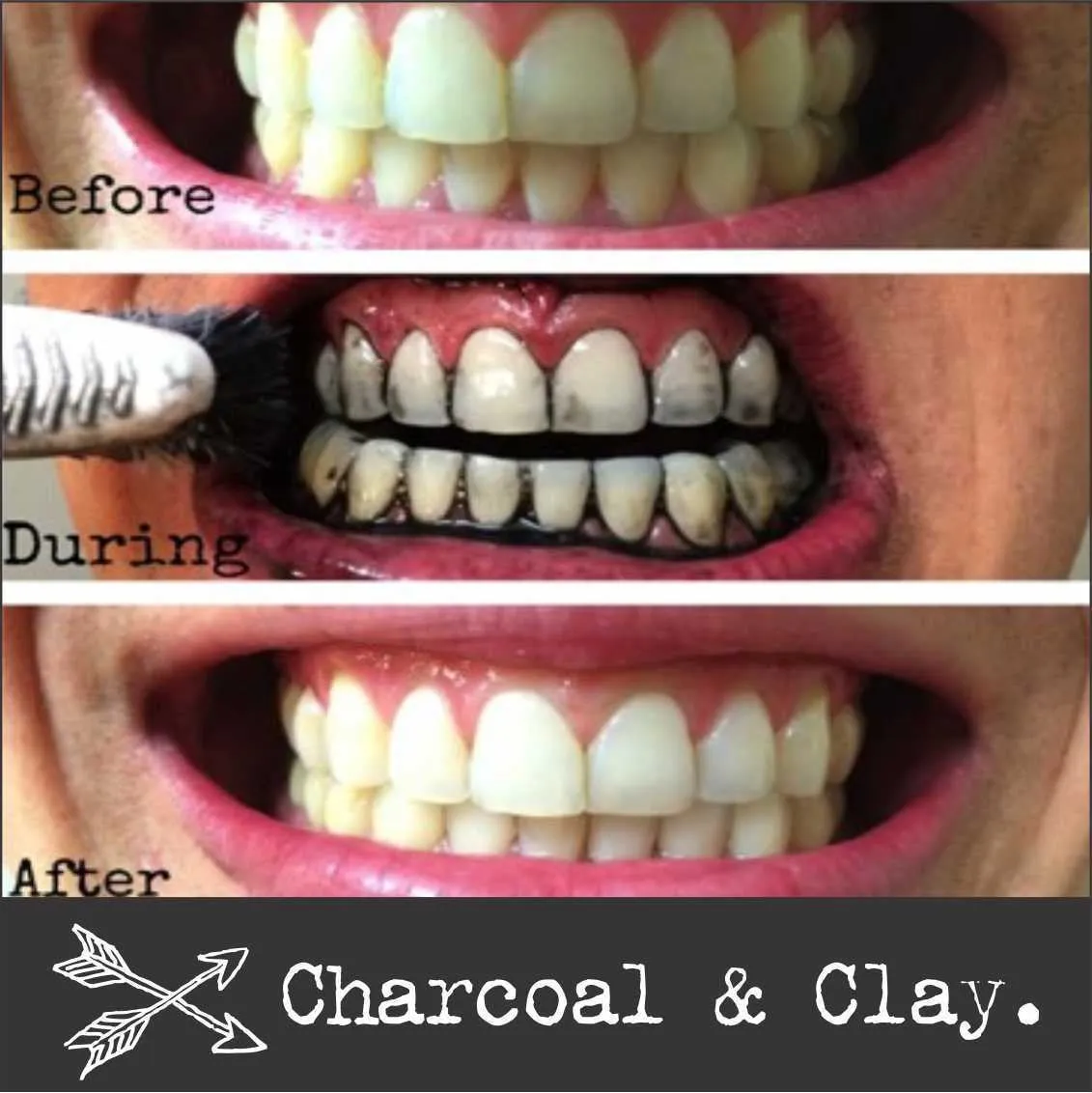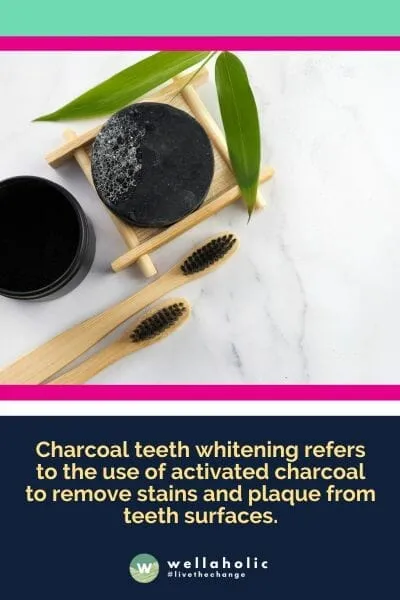What is Charcoal Teeth Whitening?
Charcoal teeth whitening has become a popular trend, with many people seeking a natural way to brighten their smiles. The practice typically involves using activated charcoal, a fine black powder, to brush the teeth. This method promises to remove stains and impurities, leading to whiter teeth. But what exactly is charcoal teeth whitening, and how does it work? Activated charcoal is produced by heating carbon-rich materials, such as coconut shells or wood, at high temperatures. This process creates a porous substance capable of absorbing toxins and removing stains. Unlike regular charcoal, activated charcoal is specifically treated to make it safe for use and increase its absorptive properties. People use it to whiten teeth and freshen breath.
How Charcoal Works for Whitening
The primary way activated charcoal whitens teeth is through its ability to absorb. As a porous substance, activated charcoal can attract and bind to stain particles, such as those from coffee, tea, and other foods. When brushing with charcoal, these stain particles are gently lifted from the surface of the teeth. This action can help remove external stains, revealing a brighter smile. Furthermore, activated charcoal helps to eliminate bacteria and other impurities in the mouth, leading to fresher breath and a cleaner feeling. However, it’s important to note that charcoal primarily affects surface stains and may not be effective on intrinsic stains caused by issues within the tooth structure itself.
The Science Behind Charcoal’s Whitening Ability

While the use of activated charcoal for teeth whitening has gained popularity, the scientific evidence supporting its effectiveness is still limited. Many users report visible results, but more research is needed to definitively confirm its benefits. Some studies suggest that activated charcoal can help remove surface stains. However, more thorough clinical trials are required to determine how well it compares to other teeth whitening methods. The science of activated charcoal’s whitening ability lies in its unique properties. The porous nature of charcoal allows it to trap and remove small particles, including stains and bacteria, effectively cleaning teeth surfaces. This absorption process gives an appearance of whiter teeth. Ongoing studies aim to explore the extent and the long-term effects of its use. More research is necessary to provide a complete understanding of the science of charcoal teeth whitening.
Fact 1 Charcoal is a Gentle Abrasive
Activated charcoal is a gentle abrasive, meaning it can help scrub away stains without harsh chemicals. This is a significant advantage for those seeking a natural teeth whitening option. As you brush with activated charcoal, its slightly abrasive texture helps to lift surface stains from the teeth. Unlike some chemical whitening treatments, charcoal’s gentle action reduces the risk of damage to the enamel. This gentle abrasion can remove stains from coffee, tea, and other foods. This process makes charcoal a favored choice for those preferring a less aggressive whitening approach. Users should still brush carefully to avoid excessive force, ensuring the process remains gentle. This gentle abrasiveness is what makes charcoal an attractive alternative to conventional methods.
Fact 2 It Removes Surface Stains
One of the primary benefits of charcoal teeth whitening is its ability to remove surface stains. These stains result from consuming various foods and drinks, like coffee, tea, red wine, and berries. The activated charcoal binds to these stains, effectively lifting them from the tooth’s surface. This process provides a noticeable improvement in the teeth’s brightness. This process can also remove plaque, which contributes to a dull appearance. Charcoal is less effective on intrinsic stains, which are stains located within the tooth structure. People find charcoal’s stain removal capabilities particularly appealing due to its natural approach. Brushing with charcoal often leads to a cleaner, brighter smile. The ability of charcoal to remove surface stains makes it a useful tool for many looking for a simple whitening solution.
Fact 3 Charcoal May Help with Bad Breath

Besides whitening teeth, activated charcoal can also help with bad breath. The charcoal’s absorbent properties not only remove stains but also absorb bacteria and impurities in the mouth. These impurities and bacteria are often significant contributors to bad breath. By eliminating these factors, charcoal can lead to fresher breath and improved oral hygiene. The charcoal helps to neutralize the compounds causing bad breath. This benefit is especially helpful for those suffering from persistent bad breath issues. Regular use of charcoal can contribute to a healthier, cleaner mouth. This added benefit makes charcoal a versatile product for oral care. Users experience not only a brighter smile but also improved breath freshness when using activated charcoal.
Fact 4 It’s a Natural Whitening Option
For those seeking a natural alternative to traditional teeth whitening products, activated charcoal offers an appealing solution. It is derived from natural sources like coconut shells or wood. The use of charcoal eliminates the need for harsh chemicals found in some commercial whiteners. This natural approach aligns with health-conscious consumers. It is a preferred choice for those looking to avoid artificial additives. Charcoal is a straightforward, accessible method. It provides a means of enhancing one’s smile without complex procedures. Choosing charcoal aligns with the growing preference for natural and sustainable health practices. For many, the natural aspect of charcoal is a significant advantage.
Fact 5 It’s Affordable and Accessible
Another appealing aspect of charcoal teeth whitening is its affordability and accessibility. Activated charcoal is readily available in various forms, including powders, toothpastes, and even charcoal-infused floss. Compared to professional whitening treatments or expensive over-the-counter products, activated charcoal is often a more budget-friendly option. The affordability makes charcoal a practical choice for many. It can be easily purchased at local pharmacies, health stores, or online retailers. The accessibility makes it a convenient option for anyone wanting to try teeth whitening at home. Its combination of cost-effectiveness and availability makes charcoal teeth whitening an attractive choice for many users. The ease of obtaining and using charcoal is a significant advantage.
Potential Risks and Considerations

While activated charcoal offers several potential benefits for teeth whitening, it is essential to consider possible risks and precautions. Some studies suggest that charcoal can be too abrasive for some people’s enamel. Excessive brushing or using charcoal products frequently might lead to enamel erosion. Once the enamel wears away, it cannot be restored, which can increase the risk of tooth sensitivity and decay. Therefore, it is important to use charcoal products cautiously and avoid excessive pressure. Additionally, charcoal may not be suitable for everyone. People with sensitive teeth or pre-existing dental issues should consult with their dentist before using charcoal. Consulting a dental professional ensures any whitening method suits the individual’s oral health needs.
Sensitivity and Enamel Damage
One of the key concerns associated with charcoal teeth whitening is the potential for increased tooth sensitivity and enamel damage. Because charcoal acts as an abrasive, it may wear down the enamel over time. Enamel is the protective outer layer of the teeth. Once it is eroded, the underlying dentin is exposed. Dentin is more porous and sensitive to temperature and touch. This can lead to increased sensitivity to hot or cold foods and drinks. Moreover, the loss of enamel increases the risk of tooth decay and other dental issues. Frequent or aggressive brushing with charcoal products can exacerbate these problems. Therefore, it is crucial to brush gently and limit the frequency of use. People with pre-existing enamel erosion or sensitive teeth should exercise caution. Regular dental check-ups are essential to monitor enamel health.
Choosing the Right Charcoal Product
When selecting charcoal products for teeth whitening, it is essential to choose reputable brands that offer high-quality products. Look for products that use food-grade activated charcoal, derived from safe sources such as coconut shells. Avoid products that contain added chemicals, artificial flavors, or harsh abrasives. Some charcoal toothpastes contain ingredients that may be detrimental to dental health. It is essential to check the ingredient list carefully. Brushing technique is also crucial. Use a soft-bristled toothbrush and brush gently, avoiding excessive pressure. Consulting your dentist is recommended before you incorporate charcoal into your oral hygiene routine. This ensures that the chosen products are safe and suitable for your specific needs. You can find a variety of charcoal products in stores, so make a well-informed decision.
